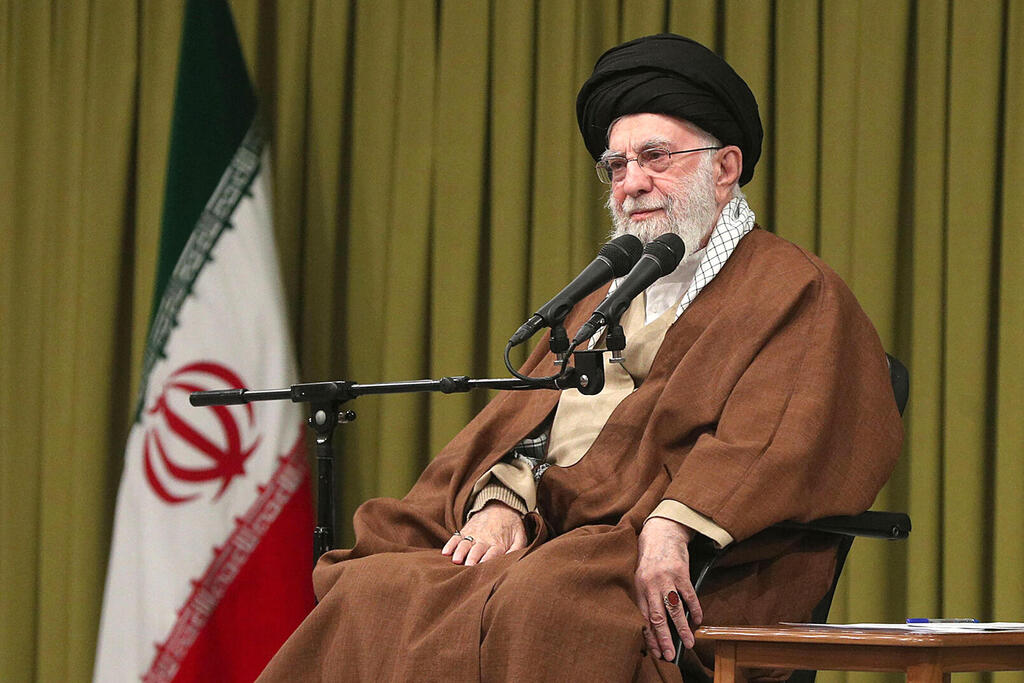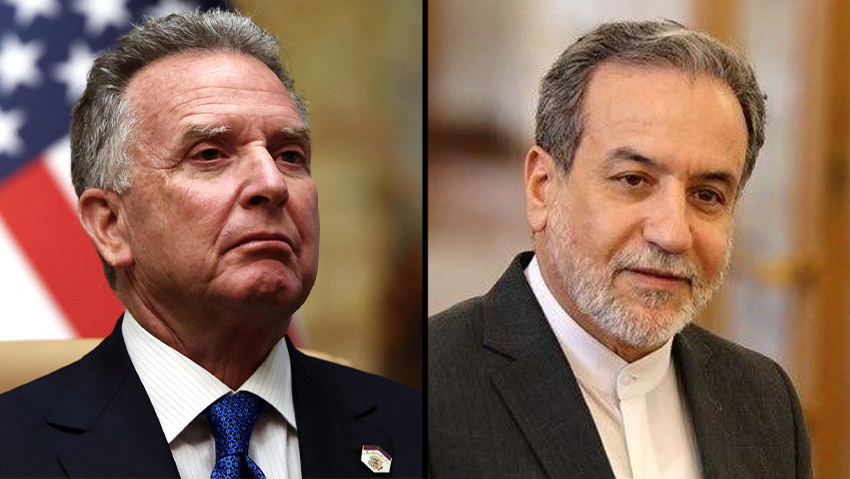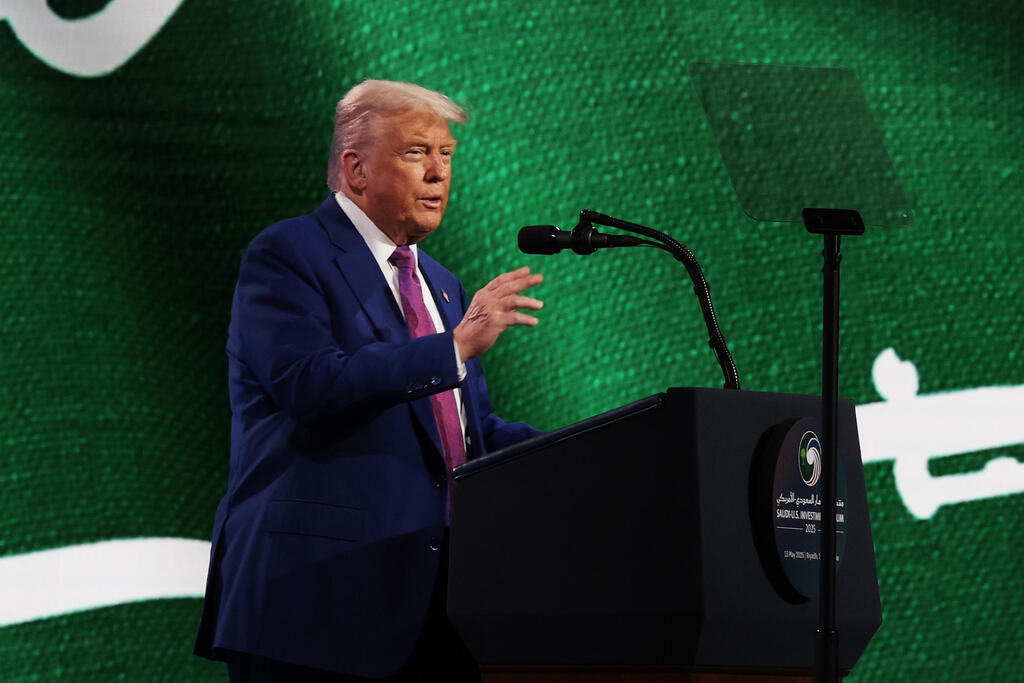In a rare glimpse of internal dissent, three Iranian officials told Reuters this week that Iran’s leadership has no viable contingency plan if nuclear negotiations with the United States collapse — a stark contrast to the image of strategic resilience often projected by Tehran.
The remarks, published late Tuesday, coincided with a separate CNN report citing fresh U.S. intelligence that Israel, skeptical of the nuclear talks, is preparing for a potential strike on Iran. Israeli officials reportedly fear any future agreement would fall short of neutralizing Iran’s nuclear threat.
4 View gallery


Ali Khamenei, Benjamin Netanyahu, Donald Trump
(Photo: Mandel NGAN/AFP, REUTERS/Mohammed Yassin, Iranian Leader's Press Office/AP)
Iranian authorities dismissed both reports as “psychological warfare.” In a statement carried by the semi-official Tasnim News Agency, officials warned of increased “propaganda and psychological operations” from Western powers aimed at undermining Iran’s negotiating team.
According to the Reuters report, if talks with Washington fail — a scenario Iranian Supreme Leader Ayatollah Ali Khamenei raised just a day earlier — Tehran plans to lean more heavily on alliances with Russia and China. "The plan B is to continue the strategy before the start of talks. Iran will avoid escalating tensions, it is ready to defend itself," a senior Iranian official said. The strategy, he added, could involve deepening ties with Moscow and Beijing.
However, the same sources warned that such a fallback is flawed. China is preoccupied with its trade war with the U.S., and Russia remains bogged down in its war in Ukraine.
Experts cited by Reuters agreed that support from both powers is not unlimited. Beijing, for instance, has demanded steep discounts on Iranian oil and may press for even lower prices if global demand weakens further — though Brent crude rose by 77 cents to $66.15 per barrel following CNN’s report.
“If talks collapse — a scenario both Tehran and Washington hope to avoid — neither Beijing nor Moscow can shield Iran from unilateral U.S. and EU sanctions,” Reuters reported.
Iran is grappling with a multitude of domestic challenges, including an economy crippled by sanctions and critical failures in water and energy infrastructure. The economic crisis has fueled widespread protests in recent years, alongside a brutal crackdown by the regime.
Additionally, Iran’s so-called “Axis of Resistance”—a loose-knit coalition of regional actors opposing Israel and Western influence across the Middle East—has suffered significant setbacks, including the weakening of Hezbollah under Israeli pressure and the collapse of the Assad regime in Syria, Tehran’s closest ally.
The Iranian officials told Reuters that amid the speedy revival of the U.S. “maximum pressure” campaign — a term used to describe sweeping sanctions reimposed under President Donald Trump and renewed in February — the ruling clerics have no better option than reaching a new nuclear deal to avert economic collapse.
"Without lifting sanctions to enable free oil sales and access to funds, Iran’s economy cannot recover,” said another official, who, like the others, asked not to be identified due to the sensitivity of the matter.
Nuclear negotiations between Iran and the United States, which resumed more than a month ago after weeks of threats from President Trump to strike Iranian nuclear sites, have entered a tense and uncertain phase. Four rounds of talks have been held so far, mediated by Oman and led by Iranian Foreign Minister Abbas Araghchi and U.S. envoy Steve Witkoff — including direct meetings between the two, the highest-level contacts between Washington and Tehran since Trump withdrew from the 2015 nuclear accord during his first term in office.
Last week, Trump struck an optimistic tone, claiming Iran had “sort of” agreed to the terms of a new deal. However, Iranian officials have issued increasingly harsh statements, fueled by Trump’s continued threats and his warning that Iran must “move quickly or something bad is going to happen.”
Khamenei escalated the rhetoric on Tuesday, firmly rejecting a U.S. demand that Iran cease uranium enrichment, calling it “excessive and outrageous,” and predicting the talks would likely fail.
Despite an official statement from Iran’s Foreign Ministry saying talks would continue, negotiators are walking a diplomatic tightrope. The two sides remain deeply divided over Iran’s uranium enrichment program. U.S. statements during the talks have been inconsistent — at times demanding a complete halt to enrichment, and at others suggesting low-level enrichment might be tolerated. Tehran has expressed willingness to accept limits that would cap enrichment at non-weapons-grade levels, but firmly refuses to halt it entirely.
Further complicating the talks, Iranian sources and a European diplomat told Reuters that Tehran has refused to export its stockpile of highly enriched uranium — Russia had been mentioned as a potential recipient — and remains unwilling to negotiate its ballistic missile program. Iranian officials also remain deeply distrustful of Trump, citing his abrupt withdrawal from the 2015 deal, and are demanding guarantees the U.S. cannot do so again.
Even if an agreement on enrichment is reached, questions remain over the timeline and manner of lifting sanctions. Washington reportedly prefers a gradual rollback, while Tehran insists on immediate and comprehensive sanctions relief.
Wendy Sherman, former lead U.S. negotiator on the 2015 accord, told Reuters she doubts Iran would fully dismantle its enrichment program — a condition she called ideal but unrealistic. "So that means they will come to an impasse, and that we will face the potential for war, which I don't think, quite frankly, President Trump looks forward to because he has campaigned as a peace president," she said.
Still, Trump has made it clear he is not ruling out force. During a recent visit to Gulf states, he denounced “wars that spiral out of control,” but threatened “maximum pressure” if talks fail, including potential sanctions on any country buying Iranian oil.
Meanwhile, France, Britain and Germany — the European powers still party to the original deal — have warned they may reinstate their own sanctions on Iran under a so-called "snapback mechanism" if no agreement is reached. Under the terms of the 2015 accord, they have until October 18 to do so, but diplomats told Reuters they may act as early as August without progress.
Even in the best-case scenario, any breakthrough would still require time. As with the original negotiations, which produced a preliminary framework in 2013 before a final deal in 2015, diplomats warn a full agreement could take many more months.
"There is no reason to think it will take less time than the 18 months in 2013 especially when the parameters and the geopolitical situation is more complicated now," a senior European official said.




